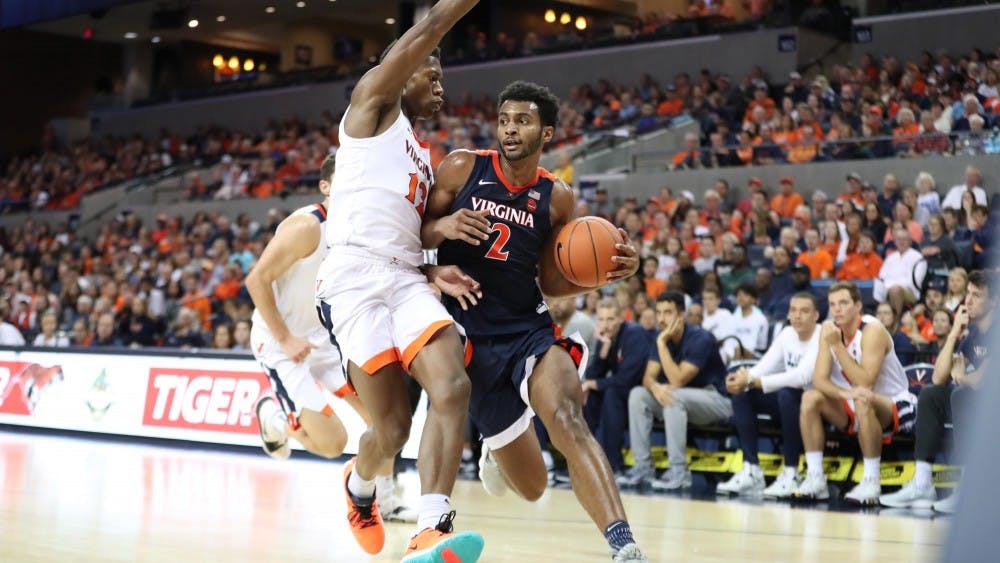Junior small forward Braxton Key received a hardship waiver from the NCAA last week, granting him immediate eligibility for the 2018-19 season. Key, who transferred from Alabama following a regression in his sophomore season, immediately elevates Virginia’s defensive ability in the second unit and could create nightmarish matchups for opponents when paired with sophomore small forward De’Andre Hunter.
With the waiver approved, Virginia’s roster is largely calcified for the upcoming season. I still believe that veteran Cavaliers from last year will start, but Key’s experience, proven on-ball defensive ability and NBA frame will make him an invaluable sixth man. He could see starter’s minutes if his shooting percentage improves. Further down on the bench, sophomore forward Jay Huff and sophomore shooting guard Marco Anthony should see meaningful time, and freshman point guard Kihei Clark will likely be needed when junior point guard Ty Jerome is on the bench.
Key’s waiver most adversely affects the playing time of redshirt freshman small forward Francesco Badocchi, who returns to the Cavaliers after sitting out his first year to recover from a surgery. He is a taller small forward in the mold of Key and Hunter, but will probably find himself on the wrong end of a logjam at the position. With Hunter’s possible departure to the NBA, however, look for Badocchi and Key to provide as dangerous a duo in the 2019-20 season as Key and Hunter will be this season.
Key was originally recruited by Coach Tony Bennett and the Cavaliers for the Class of 2016, but chose the Cirmson Tide after Hunter’s commitment took up the last scholarship spot. His first season at Alabama was exceptional, as he averaged 12 points and nearly six boards per game. Key received freshman All-SEC honors, but the arrival of blue chip guard recruit and current Cleveland Cavalier Collin Sexton during his sophomore season took the spotlight off of Key.
Relegated to a fifth option offensively and hampered with an early meniscus injury, Key’s production dropped to only seven points per game in the 2017-18 season. He had games in which he returned to his former self, but appeared uninterested and lethargic on the court at times. With a full year to heal and a program better fitted for his skills in on-ball defense and screen setting, the stage is set for Key to make a full rebound in Charlottesville.
Key brings a set of talents to Virginia that make him a perfect fit for the program. Virginia’s mover-blocker offense struggled at times to get adequate penetration to the paint, and its notoriously slow tempo stifled the points it could receive in transition. So long as the three-point percentages remain high and the pack line holds, Virginia’s constrictor-like approach to basketball is unstoppable, but the Cavaliers struggle to improvise when either doesn’t happen.
Key, much like Hunter, provides a way for Virginia to step out of the mold on offense. He is excellent in transition and has the ability to penetrate against even elite defenses. Once in the lane, he has the versatility to either drive to the rim or distribute to a big or an outside shooter. Key brings explosiveness that can be lacking on Virginia’s offense but should be seen primarily as a blocker and distributor when the offense is in its usual half-court scheme.
For Virginia to get the most out of what looks to be an already exceptional contributor, Bennett and his staff will have to work on helping Key work on his outside shot and defense inside the pack line scheme. Key does not need to be a prolific shooter to see playing time — the Cavaliers have a great shooting presence on the court already. However, adding a limited outside presence will force defenses to stay honest with Key when he is beyond the arc. This takes pressure off of Jerome, Hunter and junior guard Kyle Guy, all of whom already provide elite three-point numbers.
While Key will likely receive playing time regardless of whether his shooting percentage increases from last year, defense is a non-negotiable for Bennett’s staff. Key has shown great defensive prowess on the perimeter, but he will need to work on his motor to play the pack line at the ACC level. Bennett keeps players off the floor if they are seen as a defensive liability, and while this isn’t likely to happen to Key, it is possible in a worst-case scenario if he continues to regress.
Potentially the most interesting lineup featuring Key will feature him at the three, Hunter at the four and junior power forward Mamadi Diakite at the five. This lineup trades interior defense for pure athleticism, but freeing up Hunter to use his quickness at the four could provide a major mismatch for taller teams like Syracuse and Louisville. At its best, this lineup would shock teams lulled into Virginia’s slow tempo and provide the Cavaliers with a quick burst of points in transition or the paint.
Overall, Key’s addition to the 2018-19 Cavaliers turns them back into a potential title contender. He is an exceptional and unselfish offensive weapon, comes prepackaged with great on-ball defense and could create effective mismatches when paired with Hunter. Should his motor and off-ball defensive ability continue to improve, Key is the final piece missing for one of the best teams ever assembled under Bennett.
Luke Beasey is a Sports Columnist for The Cavalier Daily. He can be reached at ldb2cj@virginia.edu or followed on Twitter @luke_beasey.
Correction: This article previously misstated the mascot of Alabama to be the "Red Tide." It has since been updated to be the "Crimson Tide."







